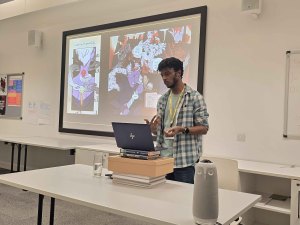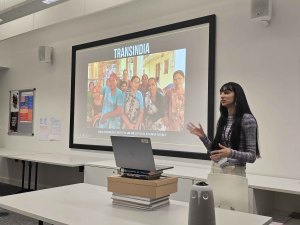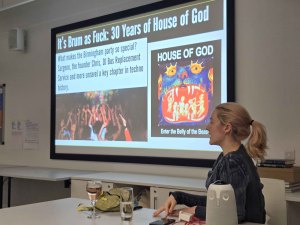
Three Fascinating Talks for our ‘Transgressive Identities and Subjectivities’ Theme
At this month’s BCMCR event we were treated to three fascinating talks from local creative industry and media sector leaders, each responding to our research theme ‘Transgressive Identities and Subjectivities’.

Corey Brotherson
First up was award-winning, Birmingham based writer, journalist, editor and creative force in the videogame industry, Corey Brotherson. Even though he has worked on such global gaming successes as Spiderman and Horizon Zero Dawn, it was clear that creating diverse characters that “go against the grain” of societal norms, that find their own way of transgressing and pushing against inequalities, feature strongly in his work. He explains the impetus for this stems from his own experiences. For example, in adventure game Windrush Tales, which focuses on the world of Caribbean immigrants in the UK of the 1950s, he uses the narrative device of setting the story outside the contemporary timeframe to be freer to develop more transgressive identities for his characters. Furthermore, making one of his characters a queer black woman enables the player to understand, probably quite starkly, the challenge of finding your own identity in a heteronormative, patriarchal and xenophobic society.
Find out more about Corey’s work and projects on his website – coreybrotherson.com.

Meera Darji
Next up we heard from BCU’s very own Meera Darji. When she’s not lecturing in Media Production, Meera is undertaking practice-based research in documentary film making. Her film Transindia: The story of India’s Hijras, which she was here to talk about, won the Royal Television Society Award for best factual in the Midlands and best short documentary at the Kashish Mumbai LGBT Festival in India.
What was fascinating about Meera’s talk was her description of a “penny drop” moment: an epiphany realising that her film making practice and the subject matter can be understood as transgressive through its centering of the Hijra identity and her subjectivities. The Hijra community in India identify as neither female nor male, or as both, and see themselves as avatars of the mother goddess. For them it’s a calling, and requires bodily transformation/transgression through castration, for the purpose of bestowing blessings on others. However, they are marginalised by the wider Indian society (a hangover of British colonial rule). Meera’s choices of cinema verité documentary practice enabled her to record unguarded conversations and perspectives.
Find out more about Meera’s films and projects here – meeradarji.myportfolio.com.

Kate Knowles
The final speaker was local journalist Kate Knowles. She is one of the founders of Birmingham’s online newspaper The Dispatch, which was set up as an alternative to the increasingly nationally syndicated, click-bait-y and advert-heavy nature of local media output. Kate offered her experience of the lack of opportunities in mainstream local media to really dig into stories as a feature writer. Although she doesn’t see her work as transgressive, her talk revealed how her stories will transgress the boundaries that other journalism may (these days) avoid crossing by reporting local voices and perspectives, not just those aligned with the headlines of the day or a popular (or you could say populist?) narrative. She engages with diverse communities and unearths stories “that might not have had a hearing otherwise,” such as shedding light on a group of local women in the 18th and 19th centuries who fought to end slavery, when many around them didn’t get involved with this cause.
Critically, we learned that the business model of The Dispatch itself is a counterpoint to, and could be understood as a transgression from, that of the mainstream media, in that its investors are journalists themselves. Their investment comes from their passion for journalism rather than for the purpose of extracting individual profit.
For Kate herself, she couldn’t and wouldn’t accept the expectation that local journalists should submit up to ten stories a day, often simply rewriting press releases. Reacting against this top-down pressure led her to launch The Dispatch, which for her meant better serving the people of Birmingham with a newspaper for and about Birmingham’s communities.
You can find Kate’s journalism and other local stories on The Dispatch website here – birminghamdispatch.co.uk.
